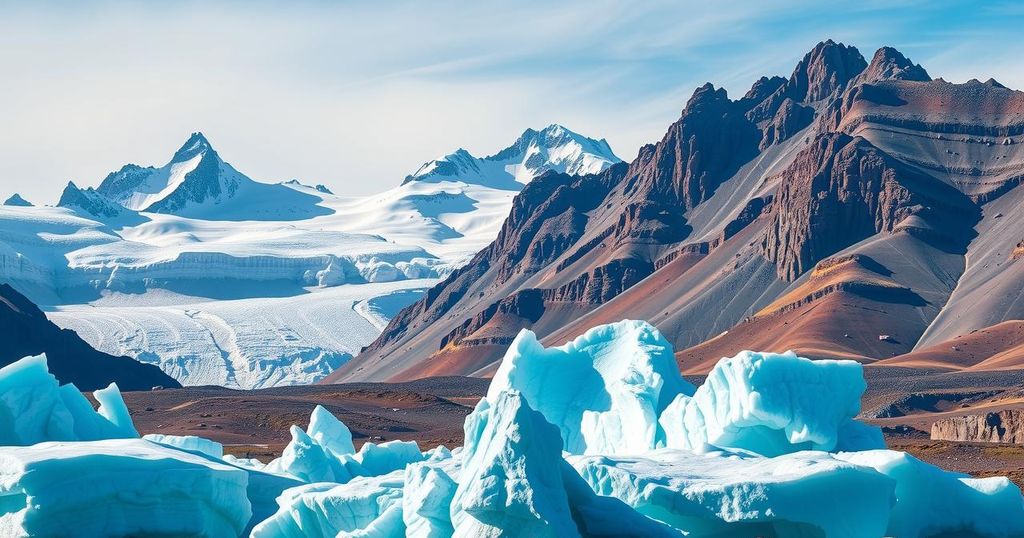Greenland’s political landscape has dramatically shifted following the recent election where right-wing parties Demokraatit and Naleraq defeated the ruling left-wing coalition. This change reflects growing international interest, particularly from the U.S., regarding the island’s mineral wealth. Jens-Frederik Nielsen, the new leader, emphasizes stabilizing U.S. relations and economic foundations as priorities going forward.
Greenland has recently witnessed a significant political shift as right-wing parties Demokraatit and Naleraq gained substantial support, defeating the left-wing coalition that had previously been in power. This electoral surprise reflects increasing international interest in Greenland, particularly in light of U.S. President Donald Trump’s past ambitions to acquire the strategically located island, known for its vast untapped mineral resources.
After the election, Jens-Frederik Nielsen, leader of Demokraatit, emphasized the urgent need for stability in U.S. relations and domestic consensus as coalition negotiations begin. He remarked on the unexpected nature of the election outcome, highlighting a transformative moment in Greenland’s political history.
During Trump’s presidency, he expressed interest in purchasing Greenland due to its mineral wealth and strategic significance, placing it high on his geopolitical agenda. While Denmark previously rejected this proposal, the prospect of increased U.S. interest remains a key factor in Greenlandic politics.
In the recent election, the ruling coalition of the left-wing Inuit Ataqatigiit and Siumut parties faced a dramatic setback, capturing only 21% and 15% of the vote respectively, a notable decline from the two-thirds majority they previously held. This allowed the center-right Demokraatit party to win approximately 30% of the vote, marking a seismic shift in the political landscape.
Nielsen reiterated the importance of establishing robust economic foundations before pursuing complete independence from Denmark, advocating for a gradual approach. He acknowledged the necessity of negotiating with multiple factions, including Naleraq, to ensure a cohesive government structure that represents a united front amidst external pressures.
Support for independence varies among Greenlanders, with many emphasizing the need for economic stability before any drastic political changes. An anonymous taxi driver articulated a common sentiment: “Greenlanders want independence, but we need money.” Tying economic growth to political goals is a recurrent theme among citizens.
The island’s natural resource abundance—ranging from nickel to diamonds—has intensified its geopolitical relevance, spurred by climate change revealing new resources. This has raised concerns that the U.S. interest is largely driven by Greenland’s mineral potential rather than national security.
Nielsen’s coalition victory can also be attributed to widespread dissatisfaction with the previous government’s handling of economic policies, particularly a contentious new fisheries law that has frustrated many within the crucial fishing industry. This discontent, coupled with economic difficulties and healthcare service dissatisfaction, fueled support for the right-wing parties.
As Demokraatit prepares to lead, their government is expected to adopt a more pragmatic and economically focused approach, emphasizing growth and responsible resource management as a precursor to potential sovereignty. As coalition talks commence, it remains to be seen how Greenland’s political future will unfold, but the recent election undoubtedly reshapes its trajectory on the global stage.
In conclusion, Greenland’s recent election marks a pivotal moment in its political history, ushering in a right-wing coalition led by Demokraatit. This shift reflects not only rising international interest, particularly from the United States, but also domestic concerns regarding economic stability and dissatisfaction with previous governance. The future of Greenland, as it navigates coalition talks and broader geopolitical interests, will likely hinge on its ability to balance aspirations for independence with the need for economic resilience.
Original Source: www.aa.com.tr






